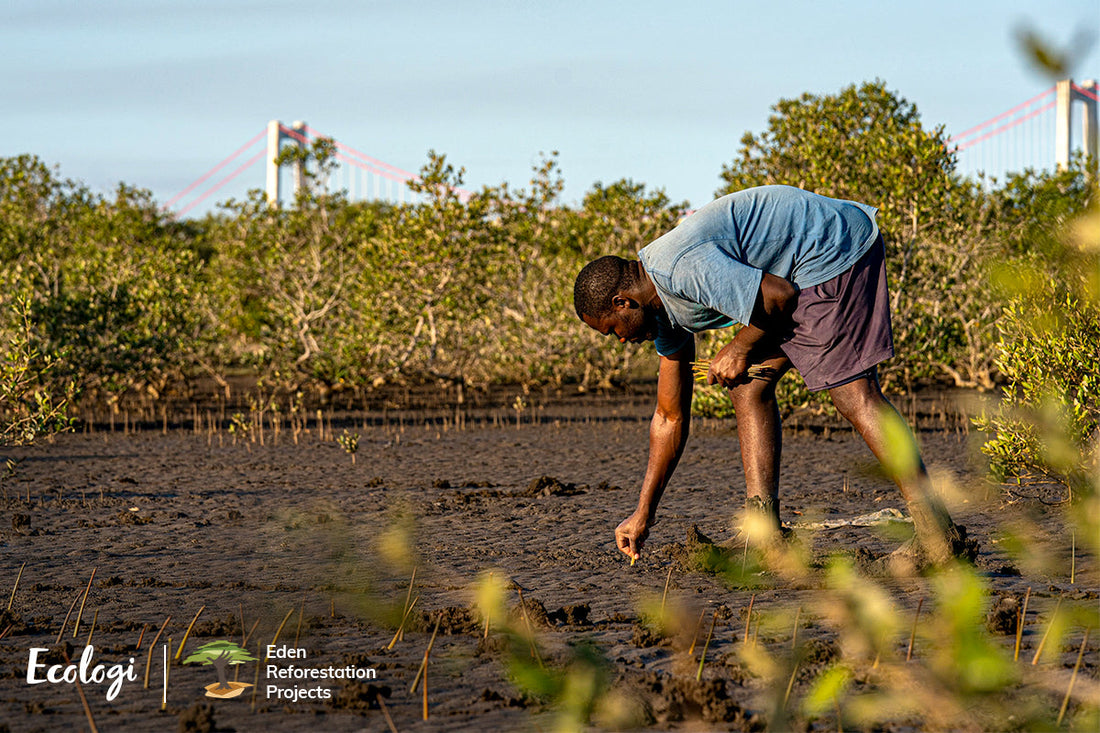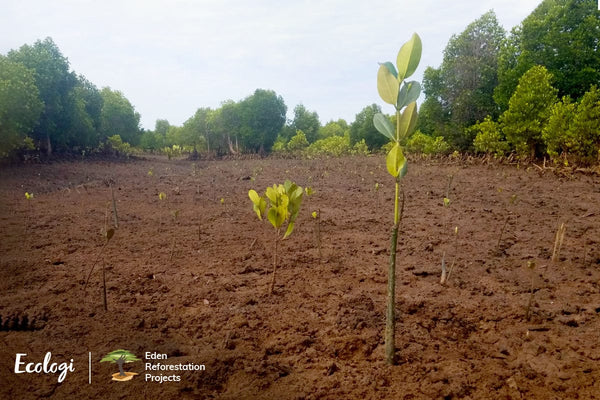Interview with Ecologi: COP26, carbon offsetting and reforestation

Interview with Ecologi: COP26, carbon offsetting and reforestation
As COP26 comes to a close this week, we thought there was no better time to sit down with Ecologi and understand what they are trying to achieve, learn a little more about the climate crisis, and to discuss carbon offsetting and what the reality of this looks like.
Ecologi’s Climate Impact Manager, Sam Jackson, has been attending COP26, so we couldn’t be in safer hands.
Q: What is Ecologi and what are you trying to achieve?
S: Ecologi is an online platform designed to allow individuals, families and businesses to contribute towards effective climate action. Our mission is to reduce and mitigate 50% of current emissions by 2040, and we aim to achieve this through rounding up the world’s pocket change, and directing it to solutions like forest restoration and carbon reduction projects, like renewable energy. We believe that with a little bit of money from a lot of people, we can support and restore nature, and accelerate the decarbonisation of global industries, to reverse climate change.
Q: How does Ecologi work? What can a new customer expect?
S: Our subscription customers each get a beautiful impact profile where they can see their impact visualised. With every monthly contribution (or direct contribution to your page!) you can see your virtual forest grow - representing the real trees that you have funded for planting around the world. There are interactive dashboards, showing you your impact, as well as leaderboards and data visualisations to show you exactly what your contribution is achieving.
We commit to very small margins - for our individuals and family subscribers, we pledge 85% of revenue to supporting climate action, and for businesses this figure is 77.5% (just to accommodate for the extra costs which goes into supporting our business customers).
We also track all of our impact purchases in our Public Ledger, which allows you to affirm that we are indeed spending your money where we say we will. The Public Ledger also has our Board Meeting minutes, finance reports and other key data you can browse through.
Q: How does this subscription model set you apart from other environment agencies?
S: Our model allows our customers to choose how much impact they want to have, through the different plan types we offer. This goes from funding 12x trees per month, plus offsetting 1x average carbon footprint, all the way up to 48x trees per month and offsetting 4x the average carbon footprint.
You can also add more impact whenever you like, through your impact profile, and set sustainable goals. This is because we want our platform to support and empower individuals to take positive climate action and implement change - rather than simply offsetting their carbon footprint and calling it a day!
Q: How does carbon offsetting work?
S: So, carbon footprints refer to the estimated amount of carbon emissions that are produced by a person, event or thing. Carbon offsetting refers to the act of funding the same amount of emissions reductions elsewhere, in order to balance things out. It’s really important to ensure that, when carbon offsetting, you do so using reputable and rigorous carbon standards (like the Gold Standard or Verified Carbon Standard).
It’s also important to note that carbon offsetting does not absolve anyone or anything of the negative impacts associated with their emissions. Since we need to make enormous reductions in emissions to meet global climate targets, it is always better to reduce or eradicate carbon emissions, than to emit them and then offset them. Offsetting should therefore be carried out as one part of a broader effort to live more sustainably.
You can read more about carbon offsetting on our website.

Q: How do you decide which tree planting and carbon offsetting projects to work with?
S: We maintain strict internal policies, procedures and standards to ensure that we support the best in climate action. Examples include restrictions on what kinds of projects we are happy to fund (for example, we don’t fund large hydro projects), what kind of reforestation work we support (we don’t support monocultures), or what kinds of carbon standards we will support (we only currently work with Gold Standard and VCS).
Our decision-making is also guided by our Climate Committee, a panel of experts from across academia and civil society who support us by offering counsel on big climate questions.
You can read all about our specific processes on our website in our dedicated FAQs pages - for responsible reforestation, and for carbon offsetting. You can also read about our Climate Committee and how we apply scientific knowledge on our Medium series, Building Ecologi.
Q: Typically, how much carbon does one person produce annually?
S: This depends on a number of factors. Carbon footprints are helpful because they give an idea of the average estimated carbon emissions from an individual within a sample, but they don’t give much of a picture of intra-population variation. For an ‘average’ person living in the UK, we calculate this to be around 9.6 tonnes CO2e per year. However, this could be different for you as an individual, depending on factors like how you travel, what you eat, and how you power your home.
Ultimately, if you live in a richer country, the answer is probably “too much”. Both individual decisions and systemic changes are required across our economies in order to bring down the average per capita footprint, which is considerably higher in this small number of richer countries than it is everywhere else.
Q: Do you know how many trees need to be planted a year in order to counteract the deforestation taking place?
S: Estimates vary, but in 2015, it was probably somewhere around 15 billion per year. It’s important to remember that it is vital to protect existing forest ecosystems as well as restoring them through planting new ones. Old-growth forests are home to indigenous communities, support immense biodiversity, provide services like soil stabilisation and purified water and air, and they also improve our mental health.

Q: The transparency aspect of Ecologi is unique. Why did you choose to share key business information publicly?
S: Because that’s what everyone should be doing! At Ecologi, we strive to lead the way in key areas like transparency and openness, and one of the key things we believe this adds is trust. We believe that our customers and supporters deserve to know where their money is going, and to be reassured that it’s having genuine impact - otherwise, what would be the point?
That’s why we publish our Public Ledger, and invite our community to regular Q&As with our CEO, Elliot Coad - because we want people to be able to interact with us. We also aim to be humble, and invite our community to give feedback if they think we’re going wrong somewhere, so that we can do better.
Q: Aside from signing up to Ecologi, can you tell us five ways in which we can reduce our carbon footprint at home?
S:
- Move your money: ensuring that your savings, investments, pension and so on are all with ethical banks and building societies is crucial to safeguarding your money from being used to fund fossil fuels.
- Change your energy provider: if 100% renewable energy is available where you live, prioritise switching to it.
- Prioritise low-carbon transport: reduce the number of flights you take, walk or cycle wherever you can, and consider each journey you make as an opportunity to choose a lower-carbon option.
- Eat less meat: animal products have a higher carbon footprint than plant-based products. If going vegan is unrealistic for you, start small: cut out the highest-carbon meats like beef, pork and lamb, and this will make a big difference.
- Raise your voice: whether it’s at home, in the workplace, at the ballot box - never stop advocating for climate action. Educate yourself and your peers, and vote for politicians who share your passion for climate action.
Q: What do you hope will come out of COP26?
S: We wrote two long-reads about COP26 and its potential outcomes - firstly, What Is COP26? and secondly, What Will Happen At COP26?.
We’d like to see substantial progress on divestment from fossil fuels and financing green energy provision, as well as for rich countries to start paying the $100 billion annual sum for mitigation and adaptation which they have so far failed to deliver.
We’d like to see concrete progress on climate justice, ending deforestation, and setting out the “Paris Rulebook” - the regulations for emissions trading. We’d also like for there to be substantial frameworks and guidance for organisations and civil society to help achieve the targets that will be agreed.

Q: Do any of the tree planting projects you’ve invested in take into consideration tree diversity targets?
S: We don’t support monocultures, and for each of our reforestation projects, we support the planting of varied native species. We also use technology like the Restor platform to assess what kinds of species would naturally appear in a specific area, before commencing the planting on the site, to ensure that the species lists are both ecologically appropriate and sufficiently diverse.
Q: What do you think of environmental groups who are using controversial actions as a way of protesting?
S: This is a challenging question, and even within the Ecologi team we might think about it slightly differently. Ultimately, people are protesting in these ways because they are scared for the future, and are dissatisfied with the response of our leaders and representatives in tackling climate change. Some ways of communicating and raising awareness and support for a cause are more effective than others, but ultimately these all take root in that same fear and panic about the reality of what we are doing to our climate.
At Ecologi, we see our role as tackling those anxieties with inspiring messaging and positive action, helping to enable people who might otherwise feel powerless about climate change to directly support real, impactful climate action.
Head over to Ecologi’s website for more info on how you can get involved. We’re also teaming up with them for our Green Friday offering – click here for more info.
Share
Tags
- culture
- interview
- lifestyle
- news





